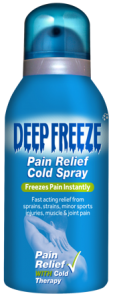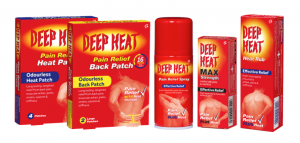There is no denying the effect of age on our skin, and experts advise it is never too soon to get into the good habits and routines that delay the arrival of fine lines, wrinkles and other signs of ageing.
However, ageing is not simply skin deep. The decline in collagen levels, which is largely responsible for wrinkles and sagging skin, also takes a toll on our muscles. But because there are no sudden visible signs of this steady loss of tone and elasticity, many of us do not realise what is happening until its too late and muscle wastage and loss of power is beginning to impact on day-to-day life.
A new poll of 2,000 people in the UK by the muscular pain treatment specialists at Deep Heat and Deep Freeze has found that seven out of ten (71%) of people had no idea we lose muscle as we age and two out of three (64%) did not know it is a particular problem for women after the menopause.
Sarcopenia, the medical term for this age-related loss of muscle mass, is thought to affect between one in ten (9%) and one in five (18%) people over the age of 65 and is associated with an increased risk of frailty, falls, disability and even death.
The rate and extent of muscle loss is influenced by a range of factors including genetics, diet and lifestyle – and there is clear evidence of the truth in the saying: “Use it or lose it!”
New research from the University of Stirling provides some crucial clues on how to maintain mobility, reduce post-exercise pain and help hold back the effects of age on our muscles.
Commenting on the research review by Angus Hunter, Director of the Health and Exercise Sciences Research Group at Stirling University, Toby Garbett, who now provides leading edge fitness training to a range of clients including schools says: “This research review suggests that warming products such as those from the Deep Heat range may help break the insidious cycle of muscle wastage, inactivity and weight gain associated with ageing.
“Increasing tissue temperature causes a decrease in tissue viscosity – which, essentially, helps muscle retain its shape and elasticity.
“Heat therapy may also act to enhance exercise performance by increasing oxygen transport and release via vasodilation.”
He adds: “In summary, this research view confirms that a combination of cold therapy, such as Deep Freeze products, in the initial acute phase, followed by soothing thermotherapy such as Deep Heat thereafter, can aid recovery and optimises the conditions for healing after injury. This minimises the period of immobility which unquestionably depletes muscle mass.”
Physiotherapist, Sammy Margo agrees: “it is important to lay the foundations and promote muscular health from an early age.
“You need flexibility, cardiovascular fitness and the right behavioural and psychological foundations to minimise the risk of muscle pain and problems – not just in old age, but at any age.”



